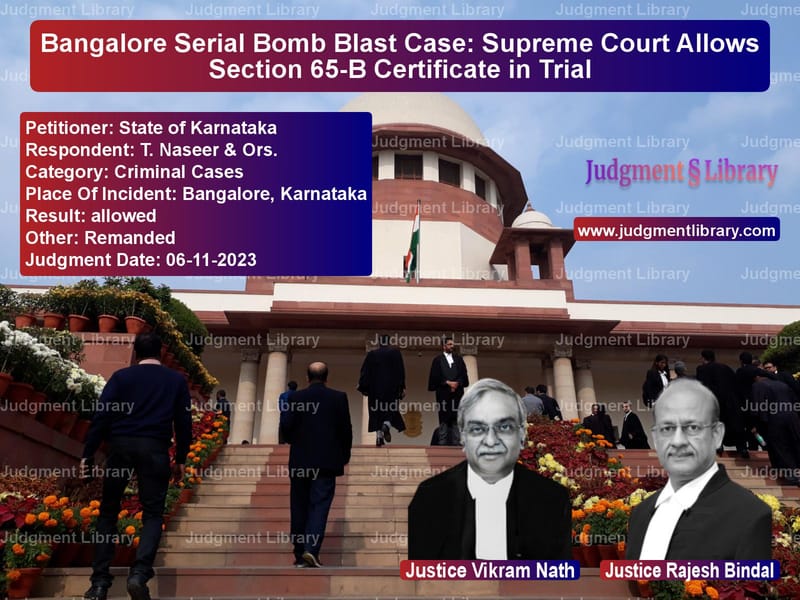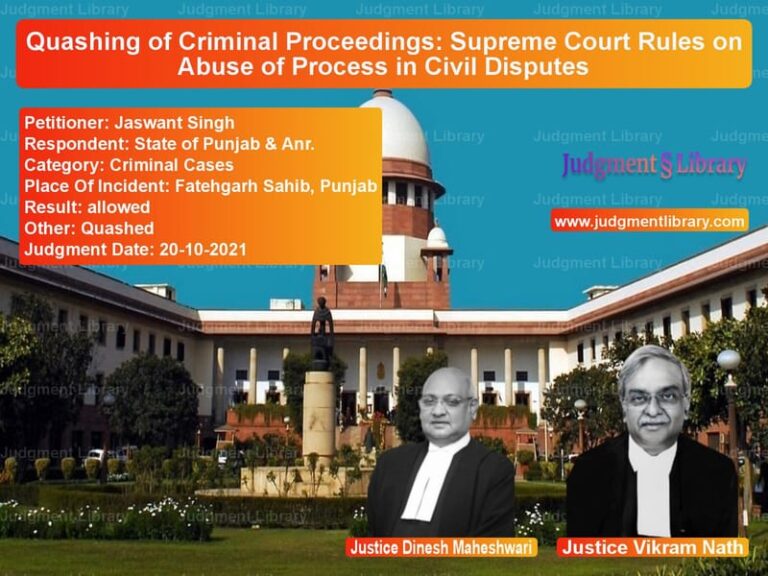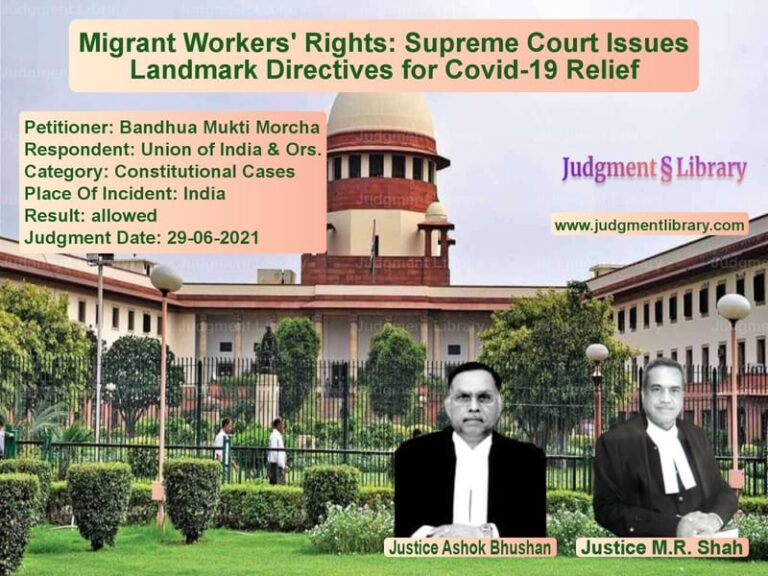Bangalore Serial Bomb Blast Case: Supreme Court Allows Section 65-B Certificate in Trial
The case of State of Karnataka vs. T. Naseer & Ors. pertains to the infamous Bangalore serial bomb blasts of July 25, 2008. The Supreme Court was called upon to decide whether the prosecution could introduce a Section 65-B certificate at a later stage in the trial to support electronic evidence, after the lower courts denied permission.
Background of the Case
On July 25, 2008, a series of bomb blasts shook the city of Bangalore, leading to the death of one woman and injuries to several others. Multiple First Information Reports (FIRs) were filed in various police stations, including Madivala, Koramangala, Byatarayanapura, Kengeri, Ashokanagar, Sampangirama, and Adugodi.
The charges included Sections 120B, 121, 121A, 123, 153A, 302, 307, 326, 337, 435, 506, and 201 of the Indian Penal Code (IPC), along with violations of the Explosive Substances Act, 1908, the Prevention of Destruction and Loss of Property Act, 1981, the Prevention of Damage to Public Property Act, 1984, and the Unlawful Activities (Prevention) Act, 1967.
Read also: https://judgmentlibrary.com/supreme-court-revises-conviction-in-rajasthan-murder-case-key-takeaways/
During the investigation, electronic devices, including laptops, external hard drives, pen drives, CDs, SIM cards, mobile phones, and digital cameras, were seized from one of the accused, Sarafaraz Nawaz. These were sent for forensic examination to the Central Forensic Science Laboratory (CFSL), Hyderabad. The CFSL report, dated November 29, 2010, detailed crucial digital evidence.
Trial Court’s Rejection of Section 65-B Certificate
The prosecution initially presented the electronic devices and the CFSL report as evidence in the trial before the XLVIII Additional City Civil and Sessions Judge, Bangalore. However, the Trial Court refused to admit the CFSL report on April 7, 2017, citing the absence of a certificate under Section 65-B of the Indian Evidence Act, 1872.
In response, the prosecution obtained a Section 65-B certificate on April 27, 2017, and sought to introduce it through a recall of PW-189, M. Krishna, an expert from the CFSL. However, the defense objected, arguing that introducing the certificate at such a late stage was impermissible. The Trial Court rejected the prosecution’s application under Section 311 of the Code of Criminal Procedure (CrPC) on January 18, 2018, holding that it was an attempt to fill gaps in the prosecution’s case.
High Court’s Ruling
The Karnataka High Court upheld the Trial Court’s decision on January 27, 2022, agreeing that the prosecution had delayed the submission of the certificate and that allowing it at a late stage would prejudice the accused.
Read also: https://judgmentlibrary.com/supreme-court-restores-bail-of-purushothaman-high-courts-order-quashed/
Petitioner’s Arguments
The State of Karnataka, represented by Additional Advocate General Aman Panwar, argued:
- The prosecution was not introducing new evidence but merely submitting a technical certificate to validate already-presented digital records.
- The Trial Court and High Court had erred in refusing the certificate, which was obtained as soon as the court insisted on its necessity.
- Electronic records were essential in proving the accused’s involvement in the terror conspiracy, and rejecting them on procedural grounds would undermine justice.
- The Supreme Court, in Anvar P.V. v. P.K. Basheer (2014) 10 SCC 473 and Arjun Panditrao Khotkar v. Kailash Kushanrao Gorantyal (2020) 7 SCC 1, held that a certificate under Section 65-B could be furnished at any stage before the trial concludes.
Respondent’s Arguments
The defense, represented by Balaji Srinivasan, countered:
- The prosecution had ample time to obtain the certificate but failed to do so for six years.
- The delay in filing the Section 65-B certificate was an attempt to rectify procedural lapses and should not be allowed.
- Accepting the certificate at this stage would violate the accused’s right to a fair trial and create legal uncertainty.
Key Legal Issues Considered
1. Can a Section 65-B Certificate Be Introduced at a Later Stage?
The Supreme Court examined its previous rulings on the issue and whether a certificate validating electronic evidence could be furnished after the evidence had already been submitted.
2. Does the Absence of a Section 65-B Certificate Invalidate Primary Electronic Evidence?
The Court analyzed whether the lack of a Section 65-B certificate completely nullified the admissibility of electronic records.
3. Balancing Fair Trial Rights and Justice in Terror Cases
The Court considered the impact of procedural delays versus the need to ensure that vital electronic evidence is not discarded in cases involving national security.
Supreme Court’s Verdict
The Supreme Court allowed the prosecution’s appeal and permitted the introduction of the Section 65-B certificate. The Court made the following key observations:
- A Section 65-B certificate can be submitted at any stage before the trial concludes. The Court reiterated its ruling in Arjun Panditrao Khotkar that a certificate is a procedural requirement and can be provided subsequently.
- Electronic records remain primary evidence even if the certificate is submitted later. The Court noted that the physical electronic devices were already marked as material exhibits.
- There was no inordinate delay by the prosecution, as the certificate was obtained soon after the Trial Court insisted on its necessity.
- The fair trial principle applies to both the prosecution and the accused. The Court emphasized that in terror cases, procedural strictness should not result in the exclusion of critical evidence.
- Rejecting electronic evidence on technicalities would be a miscarriage of justice. The Court highlighted that the accused would have full opportunity to challenge the CFSL report in cross-examination.
Key Takeaways from the Judgment
- Section 65-B Certificates Can Be Introduced Later: Courts should allow the prosecution to furnish a certificate if the trial is ongoing.
- Electronic Evidence Remains Admissible: The presence of primary electronic records ensures that minor procedural lapses do not derail trials.
- Terror Cases Require Special Consideration: National security-related trials should not be unduly hampered by rigid procedural rules.
- Balance Between Prosecution and Defense Rights: The Court ensured that both sides had fair opportunities to present and challenge evidence.
This ruling sets a significant precedent on the use of electronic evidence in criminal trials, particularly in cases involving terrorism and national security.
Petitioner Name: State of Karnataka.Respondent Name: T. Naseer & Ors..Judgment By: Justice Vikram Nath, Justice Rajesh Bindal.Place Of Incident: Bangalore, Karnataka.Judgment Date: 06-11-2023.
Don’t miss out on the full details! Download the complete judgment in PDF format below and gain valuable insights instantly!
Download Judgment: state-of-karnataka-vs-t.-naseer-&-ors.-supreme-court-of-india-judgment-dated-06-11-2023.pdf
Directly Download Judgment: Directly download this Judgment
See all petitions in Terrorist Activities
See all petitions in Cyber Crimes
See all petitions in Judgment by Vikram Nath
See all petitions in Judgment by Rajesh Bindal
See all petitions in allowed
See all petitions in Remanded
See all petitions in supreme court of India judgments November 2023
See all petitions in 2023 judgments
See all posts in Criminal Cases Category
See all allowed petitions in Criminal Cases Category
See all Dismissed petitions in Criminal Cases Category
See all partially allowed petitions in Criminal Cases Category







